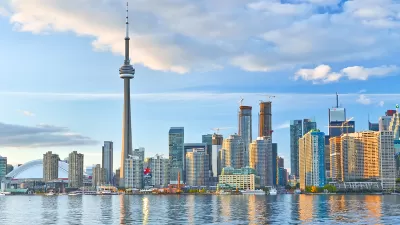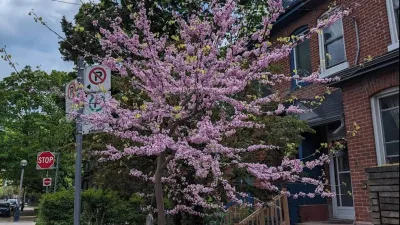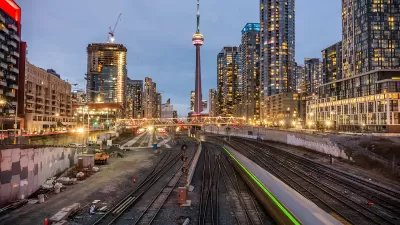As part of "Guardian Canada" week, an author writes a paean to benefits of a growing, forward looking, diverse city.

Stephen Marche explores Toronto as both "the most fascinatingly boring city in the world" and as the epitome of the 21st century post-industrial city. The description is borne from a comparison on one of its most famous North American predecessors:
Last year, the increasing population of Toronto passed the declining population of Chicago. Comparisons come naturally. What Chicago was to the 20th century, Toronto will be to the 21st. Chicago was the great city of industry; Toronto will be the great city of post-industry. Chicago is grit, top-quality butchers, glorious modernist buildings and government blight; Toronto is clean jobs and artisanal ice-creameries, identical condos, excellent public schools and free healthcare for all. Chicago is a decaying factory where Americans used to make stuff.
After describing the personality of the city as safe and reliable, even if still capable of nuance and contradiction, Marche notes the importance of the city's diversity.
At the same time, Toronto is 51% foreign-born, with people from over 230 countries, making it by many assessments, the most diverse city in the world. But diversity is not what sets Toronto apart; the near-unanimous celebration of diversity does. Toronto may be the last city in the world that unabashedly desires difference.
The article airs out more of the challenges to Toronto's ascent as a world-class city, but with a typically Canadian thread of optimism throughout.
FULL STORY: Welcome to the new Toronto: the most fascinatingly boring city in the world

Planetizen Federal Action Tracker
A weekly monitor of how Trump’s orders and actions are impacting planners and planning in America.

Congressman Proposes Bill to Rename DC Metro “Trump Train”
The Make Autorail Great Again Act would withhold federal funding to the system until the Washington Metropolitan Area Transit Authority (WMATA), rebrands as the Washington Metropolitan Authority for Greater Access (WMAGA).

The Simple Legislative Tool Transforming Vacant Downtowns
In California, Michigan and Georgia, an easy win is bringing dollars — and delight — back to city centers.

The States Losing Rural Delivery Rooms at an Alarming Pace
In some states, as few as 9% of rural hospitals still deliver babies. As a result, rising pre-term births, no adequate pre-term care and "harrowing" close calls are a growing reality.

The Small South Asian Republic Going all in on EVs
Thanks to one simple policy change less than five years ago, 65% of new cars in this Himalayan country are now electric.

DC Backpedals on Bike Lane Protection, Swaps Barriers for Paint
Citing aesthetic concerns, the city is removing the concrete barriers and flexposts that once separated Arizona Avenue cyclists from motor vehicles.
Urban Design for Planners 1: Software Tools
This six-course series explores essential urban design concepts using open source software and equips planners with the tools they need to participate fully in the urban design process.
Planning for Universal Design
Learn the tools for implementing Universal Design in planning regulations.
Smith Gee Studio
City of Charlotte
City of Camden Redevelopment Agency
City of Astoria
Transportation Research & Education Center (TREC) at Portland State University
US High Speed Rail Association
City of Camden Redevelopment Agency
Municipality of Princeton (NJ)





























